Usha Nepal: An inspiration to every working woman

- Born in Mahottari, Nepal
- Went to Balika Secondary School, Biratnagar
- Received a Bachelor’s in Arts from Banaras Hindu University, India
- Received a Master’s degree through Colombo Plan Scholarship in Patna, India
- Studies Law from Tribhuvan University, Kathmandu
- Became the first female CDO in 1989
 Being the first female Chief District Officer (CDO), which was traditionally a male domain, was certainly not easy. But I think all the life experiences I had gained up till that moment helped me prepare for the job.
I was born in a small village of Mahottari district, and at the time, we used to get homeschooled. Later, I joined a school in Biratnagar before moving to Banaras, India, with my family. I was a bright student from a young age. I dreamt of having a college degree and a career. But back then getting married was far more important for a woman than getting an education. I had many arguments with my parents because I didn’t want to get married until I had completed my studies, but my parents wouldn’t have any of it. I was married off at the age of 13. But my parents made sure that I was allowed to complete my education. My father-in-law agreed to pay for my education up until I completed my Bachelor’s degree, which I got from Banaras Hindu University (BHU), in India. I was fortunate that my in-laws were supportive of me getting my degree. This was despite my husband’s death just three years into our marriage.
Being the first female Chief District Officer (CDO), which was traditionally a male domain, was certainly not easy. But I think all the life experiences I had gained up till that moment helped me prepare for the job.
I was born in a small village of Mahottari district, and at the time, we used to get homeschooled. Later, I joined a school in Biratnagar before moving to Banaras, India, with my family. I was a bright student from a young age. I dreamt of having a college degree and a career. But back then getting married was far more important for a woman than getting an education. I had many arguments with my parents because I didn’t want to get married until I had completed my studies, but my parents wouldn’t have any of it. I was married off at the age of 13. But my parents made sure that I was allowed to complete my education. My father-in-law agreed to pay for my education up until I completed my Bachelor’s degree, which I got from Banaras Hindu University (BHU), in India. I was fortunate that my in-laws were supportive of me getting my degree. This was despite my husband’s death just three years into our marriage.
We were living in Biratnagar at the time. After completing my education, I returned and became a teacher at the very school that I went to as a young girl. But I didn’t want to get stuck there, teaching all my life. I wanted to get a Master’s degree, but my family would not allow me. Luckily, I saw a notice about the Colombo Plan Scholarship, which for me was a perfect opportunity to do what I had always wanted to do. I applied for the scholarship, sat for a test in Kathmandu, and got selected. I left for Patna for my master’s degree.
Getting the master’s degree brought a lot more opportunities for me. I came to Kathmandu and started teaching at Tri Chandra College, and Ratna Rajya Laxmi Campus. I also met many people from academia and government officers. After some time of teaching, I started working at the Women’s Training Center in Lalitpur. I worked there for three years before being transferred to Dhankuta.
The reason I was transferred is because they needed someone to fill in the position there, since the royals were set to visit the training center. I didn’t have any problem working there since I did not have a lot of responsibility. I didn’t know how big of an opportunity that was. I worked there for nearly nine years, and met a lot of people associated with various British projects. This gave me a lot of exposure. After working in Dhankuta for nearly a decade, I wanted a new challenge. That is when I approached the Ministry of Industry, Commerce and Supplies for a transfer.
A lot of things happened in between my transfer and the day I became the first woman CDO. I left for the US to attend my fellowship, and even then, I used to get letters saying the paid leave I had earned had been canceled, although it worked out well in the end. So, there were a lot of people trying to make my work-life very difficult. There were a lot of hurdles I had to face, especially because I was among the few women who worked in a male dominant workspace. People tried to bring me down and take the position I had earned. A lot of tricks were played, and a lot of controversies were cooked. A newspaper even published an article claiming that I had falsified my date of birth.
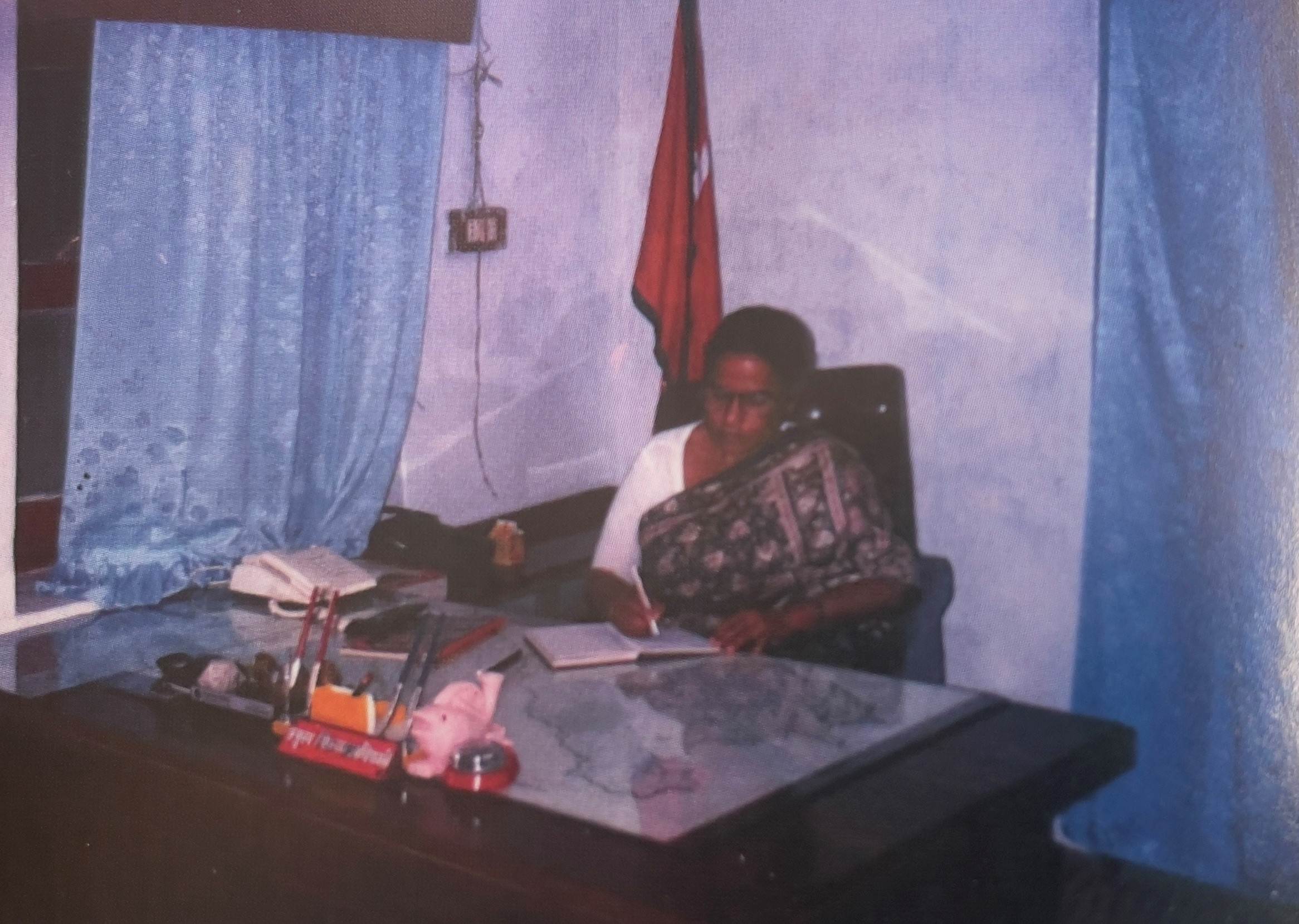 In the end, it turned out all right for me. I had done nothing wrong and I willing to defend myself. So, my suggestion to every working woman, from my own experience, is to always defend yourself when you know you are not in the wrong. You need to be straightforward and vocal if you want to go up the ladder in your career.
After being offered the position of CDO in Bhaktapur, there still were a lot of obstacles ahead of me. Most people had a problem with a woman being a district chief. They thought a woman couldn’t do the job. Even some of my colleagues would make comments like “Maybe we should start wearing a frock now”. It was their way of letting me know that I, a woman, was not capable of handling the CDO’s job. They also thought that I got the position because I had some relatives in the government. There were many rumors and baseless news articles regarding how I got the job, but I persevered and continued to do my work.
After the party-less Panchayat system came to an end, there were a lot of political changes in the country. It was around this time, I had the desire to go work in some rural part of Nepal. But the new home minister at the time, KP Sharma Oli, did not want me gone. Maybe it was because it would set a bad impression for the government to send the only woman CDO to a rural district. But I had made up my mind. I got to work in Solukhumbu, Mustang, and Parsa districts. There were still a few months left before my retirement when I was sent with a team to Jhapa in order to certify the Bhutanese refugees in the area. But, within seven days of working there, I was told that I was fired because of the dispute concerning my birth date. After my retirement from government services, I was elected as the Commissioner for the Election Commission in 2007, and was actually the first woman to become a commissioner.
If you stick to being honest, and not losing self-respect, it is possible to go through anything in life. That’s what I learned from my experience. I do think that it was comparatively easier for me to achieve my goals. I didn’t have family responsibilities like most women do, but it is still possible for women to achieve their dreams. It makes me happy to see so many women pursuing a career as well as balancing their household. Every woman can do what I did.
About her
Asta Laxmi Shakya (Former Student)
In the end, it turned out all right for me. I had done nothing wrong and I willing to defend myself. So, my suggestion to every working woman, from my own experience, is to always defend yourself when you know you are not in the wrong. You need to be straightforward and vocal if you want to go up the ladder in your career.
After being offered the position of CDO in Bhaktapur, there still were a lot of obstacles ahead of me. Most people had a problem with a woman being a district chief. They thought a woman couldn’t do the job. Even some of my colleagues would make comments like “Maybe we should start wearing a frock now”. It was their way of letting me know that I, a woman, was not capable of handling the CDO’s job. They also thought that I got the position because I had some relatives in the government. There were many rumors and baseless news articles regarding how I got the job, but I persevered and continued to do my work.
After the party-less Panchayat system came to an end, there were a lot of political changes in the country. It was around this time, I had the desire to go work in some rural part of Nepal. But the new home minister at the time, KP Sharma Oli, did not want me gone. Maybe it was because it would set a bad impression for the government to send the only woman CDO to a rural district. But I had made up my mind. I got to work in Solukhumbu, Mustang, and Parsa districts. There were still a few months left before my retirement when I was sent with a team to Jhapa in order to certify the Bhutanese refugees in the area. But, within seven days of working there, I was told that I was fired because of the dispute concerning my birth date. After my retirement from government services, I was elected as the Commissioner for the Election Commission in 2007, and was actually the first woman to become a commissioner.
If you stick to being honest, and not losing self-respect, it is possible to go through anything in life. That’s what I learned from my experience. I do think that it was comparatively easier for me to achieve my goals. I didn’t have family responsibilities like most women do, but it is still possible for women to achieve their dreams. It makes me happy to see so many women pursuing a career as well as balancing their household. Every woman can do what I did.
About her
Asta Laxmi Shakya (Former Student)
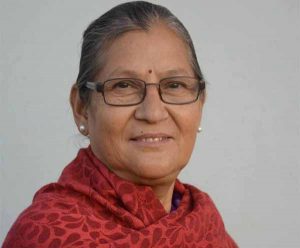 I met her for the first time when I was studying in Ratna Rajya Laxmi Campus. I was a student of Psychology and she was my teacher. Her personality, from that moment, was very impressive. She was a straightforward, strong woman. I wanted to be like her someday. The way she dealt with society, and the perception towards working women is praiseworthy. She is one of the most inspirational people I have met in my life.
Indira Basnet Koirala (Colleague)
I met her for the first time when I was studying in Ratna Rajya Laxmi Campus. I was a student of Psychology and she was my teacher. Her personality, from that moment, was very impressive. She was a straightforward, strong woman. I wanted to be like her someday. The way she dealt with society, and the perception towards working women is praiseworthy. She is one of the most inspirational people I have met in my life.
Indira Basnet Koirala (Colleague)
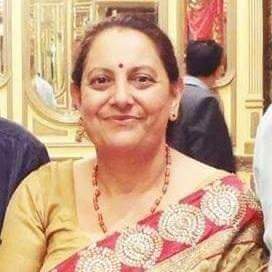 I used to hear about her works even before I met her in person. I knew she was an inspiration to every woman trying to pursue a career. She dealt with a lot of challenges, personally and professionally, but still kept going on with her work. Once I got to meet her, and get to know her better, I realized what an incredible person she was. Even if you have met her once, you can see how strong and independent she is. It’s not easy to come across someone like her.
Mallika Bhattarai (Family)
I used to hear about her works even before I met her in person. I knew she was an inspiration to every woman trying to pursue a career. She dealt with a lot of challenges, personally and professionally, but still kept going on with her work. Once I got to meet her, and get to know her better, I realized what an incredible person she was. Even if you have met her once, you can see how strong and independent she is. It’s not easy to come across someone like her.
Mallika Bhattarai (Family)
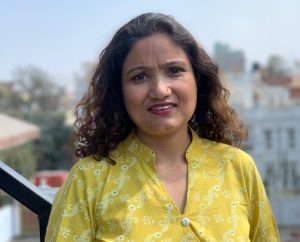 Knowing what she has gone through in her life, from personal tragedy to struggles she went through during her career, I really appreciate how hard she has worked. Our society still holds a narrow mindset when it comes to independent women. So, I can’t imagine how hard it must have been to do everything she did at that time. She is kind, generous, and treats everyone equally. She is one of the many women that I look up to.
Knowing what she has gone through in her life, from personal tragedy to struggles she went through during her career, I really appreciate how hard she has worked. Our society still holds a narrow mindset when it comes to independent women. So, I can’t imagine how hard it must have been to do everything she did at that time. She is kind, generous, and treats everyone equally. She is one of the many women that I look up to.
related news
Harry Bhandari: An inspiring tale of Nepali immigrant in the US
Sept. 14, 2023, 4:06 p.m.
Baburam Bhattarai: An analysis on Nepal’s underdevelopment
Sept. 4, 2023, 9:36 a.m.
Shyam Goenka: Institutionalizing free press and democracy
Aug. 29, 2023, 7:42 p.m.
Sunil Babu Pant: A guardian of LGBTIQA+ community
March 11, 2023, 10:01 p.m.
Anupama Khunjeli: A trailblazer banker
Feb. 19, 2023, 12:54 a.m.
Capt Siddartha Jang Gurung: Aviation rescue specialist
Feb. 12, 2023, 1:26 a.m.
Bhuwan Chand: Born to perform
Feb. 4, 2023, 6:36 p.m.
Dr Bhagawan Koirala: Man of heart
Jan. 28, 2023, 9:24 p.m.




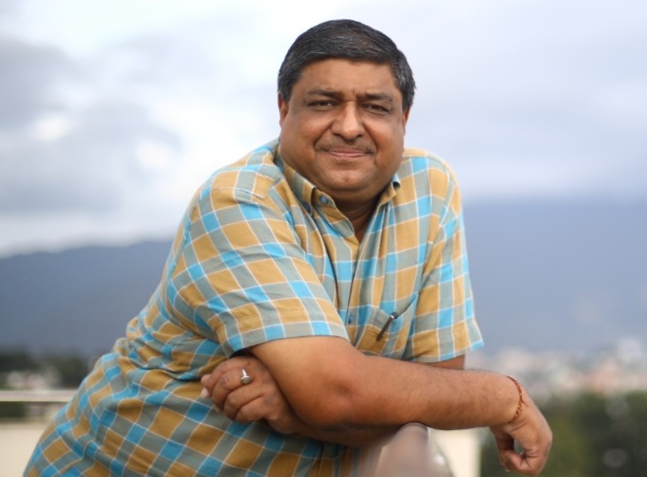





Comments